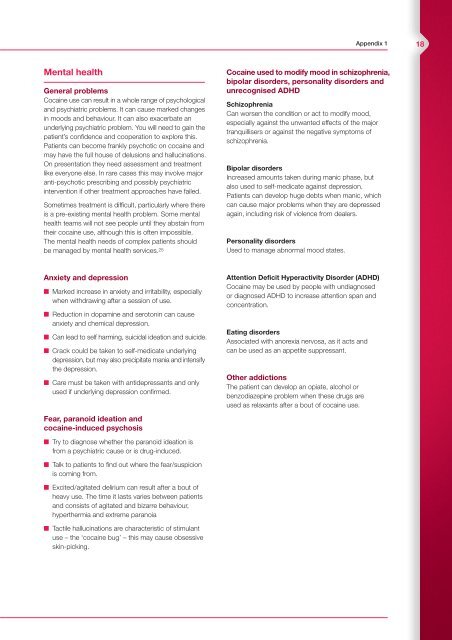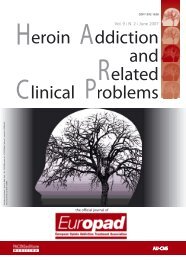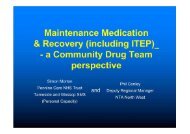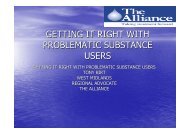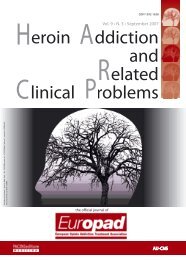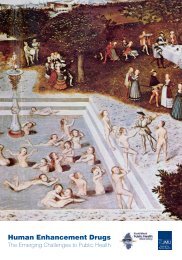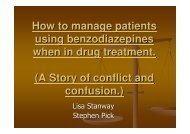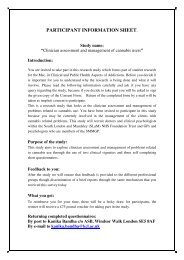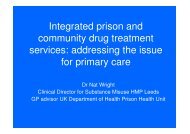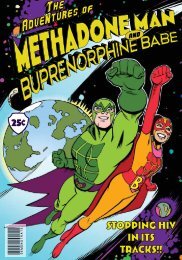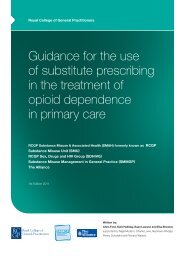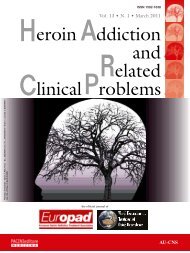17Appendix 1Cardiovascular problems including heart,blood pressure and circulation problems■ Blood pressure can be increased and needs tobe checked regularly. This can result from a period <strong>of</strong>sustained use, and tends to return to normal after aperiod <strong>of</strong> abstinence. High salt intake can alsocontribute, where salt has been used in crackpreparation.■ Cocaine use can lead to rhythm changes andarrhythmias, which if untreated can be fatal. The risk<strong>of</strong> arrythmias increases greatly during binges, butreduces again during periods <strong>of</strong> low use/abstinence.Cannabis and cigarette smoking can increase thesearrhythmias.■ Angina, myocardial infarction and congestive heartfailure can result from reduced heart muscle function,increased heart size and arteriosclerosis <strong>of</strong> thearteries. 24■ Cocaethylene, formed by combination <strong>of</strong> <strong>cocaine</strong> andalcohol increases the risk <strong>of</strong> heart problems.■ Bacterial or viral endocarditis can result from injecting.■ DVT, more common than in heroin injectors.Liver problems■ Cocaine can exert stress upon the liver and heavyuse may lead to increased liver damage, especially ifthe patient is hepatitis C positive or is a heavy drinker.■ Acetone is used to recycle the <strong>cocaine</strong> remaining inthe pipe after smoking. It is toxic and can causeliver damage.■ Some patients will consume large amounts <strong>of</strong> alcoholto cope with the feeling <strong>of</strong> ‘come-down.’ This maymean that a whole bottle <strong>of</strong> spirits is taken in a veryshort time period, increasing the risk <strong>of</strong> damage.■ When <strong>cocaine</strong> and alcohol are taken together theyproduce cocaethylene, which is more toxic to the liverthan either substance alone.Kidney problems■ Renal artery spasm, thrombosis or embolism canresult in renal colic and/or kidney infarction.Central Nervous System■ Convulsions/seizures can be caused by increasedbody temperature and constriction <strong>of</strong> the small bloodvessels in the head, but <strong>cocaine</strong> and its breakdownproducts also reduce the epileptic threshold.Cocaethylene is especially potent in this regard, andits effect may last for up to 24 hours after ingestion.■ Cerebral vascular accidents (CVA) (strokes) resultingin cerebral haemorrhages, which are caused by delicateblood vessels breaking■ Hallucinations, delusions, paranoia, depression, anxiety.Blood Borne Viruses■ HIV, hepatitis B and C can be transmitted by all themain methods <strong>of</strong> drug use, via sharing injectingequipment and unprotected sex.■ Hepatitis C can lead to a multitude <strong>of</strong> symptomsincluding lethargy and depression.■ If the patient is HIV positive, drug use can increasethe viral load and decrease the CD4 count. Patientswith a low CD4 count or who are immuno-suppressedare at increased risk <strong>of</strong> infection.Sexual health■ Increased risk <strong>of</strong> contracting STIs as a result <strong>of</strong> unsafeand unprotected sex, due to the disinhibiting effect<strong>of</strong> stimulants.■ Anaesthetic effect, reduction <strong>of</strong> vaginal secretions andprolongation <strong>of</strong> sexual activity leading to genital trauma.■ Combined sildenafil (Viagra) and crack use cancause problems.■ People who buy sexual services may start using crack.This is becoming a small but significant population.■ Risk-taking leading to violence (especially in thesex industry).Other problems■ Chronic use can result in abdominal cramps, gastritisand ulcers.■ Cocaine use can cause immuno-suppression leadingto increased risk <strong>of</strong> infections.■ Complications can occur with coexisting physicalproblems such as epilepsy and sickle cell disease.■ Blood vessel spasm leading to blindness, to ischaemiain limbs and to infarction in the intestines.■ Cocaine can raise the blood glucose, and coupledwith poor eating habits results in an increased risk<strong>of</strong> diabetes. Usual diabetic symptoms, such as thirst,hunger, polyuria and fatigue can be masked bycrack taking.■ Anaemia can result from poor injecting techniques(resulting in loss <strong>of</strong> blood) and poor diet.■ Herpes can be passed from sharing pipes and sex.
Appendix 1 18Mental health<strong>General</strong> problemsCocaine use can result in a whole range <strong>of</strong> psychologicaland psychiatric problems. It can cause marked changesin moods and behaviour. It can also exacerbate anunderlying psychiatric problem. You will need to gain thepatient’s confidence and cooperation to explore this.Patients can become frankly psychotic on <strong>cocaine</strong> andmay have the full house <strong>of</strong> delusions and hallucinations.On presentation they need assessment and treatmentlike everyone else. In rare cases this may involve majoranti-psychotic prescribing and possibly psychiatricintervention if other treatment approaches have failed.Sometimes treatment is difficult, particularly where thereis a pre-existing mental health problem. Some mentalhealth teams will not see people until they abstain fromtheir <strong>cocaine</strong> use, although this is <strong>of</strong>ten impossible.The mental health needs <strong>of</strong> complex patients shouldbe managed by mental health services. 25Cocaine used to modify mood in schizophrenia,bipolar disorders, personality disorders andunrecognised ADHDSchizophreniaCan worsen the condition or act to modify mood,especially against the unwanted effects <strong>of</strong> the majortranquillisers or against the negative symptoms <strong>of</strong>schizophrenia.Bipolar disordersIncreased amounts taken during manic phase, butalso used to self-medicate against depression.Patients can develop huge debts when manic, whichcan cause major problems when they are depressedagain, including risk <strong>of</strong> violence from dealers.Personality disordersUsed to manage abnormal mood states.Anxiety and depression■ Marked increase in anxiety and irritability, especiallywhen withdrawing after a session <strong>of</strong> use.■ Reduction in dopamine and serotonin can causeanxiety and chemical depression.■ Can lead to self harming, suicidal ideation and suicide.■ Crack could be taken to self-medicate underlyingdepression, but may also precipitate mania and intensifythe depression.■ Care must be taken with antidepressants and onlyused if underlying depression confirmed.Fear, paranoid ideation and<strong>cocaine</strong>-induced psychosisAttention Deficit Hyperactivity Disorder (ADHD)Cocaine may be used by people with undiagnosedor diagnosed ADHD to increase attention span andconcentration.Eating disordersAssociated with anorexia nervosa, as it acts andcan be used as an appetite suppressant.Other addictionsThe patient can develop an opiate, alcohol orbenzodiazepine problem when these drugs areused as relaxants after a bout <strong>of</strong> <strong>cocaine</strong> use.■ Try to diagnose whether the paranoid ideation isfrom a psychiatric cause or is drug-induced.■ Talk to patients to find out where the fear/suspicionis coming from.■ Excited/agitated delirium can result after a bout <strong>of</strong>heavy use. The time it lasts varies between patientsand consists <strong>of</strong> agitated and bizarre behaviour,hyperthermia and extreme paranoia■ Tactile hallucinations are characteristic <strong>of</strong> stimulantuse – the ‘<strong>cocaine</strong> bug’ – this may cause obsessiveskin-picking.


